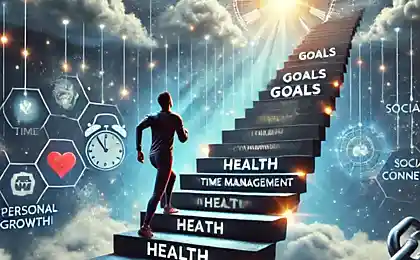183
10 Ways to Turn Hard Times into the Beginning of a Better Life
Difficult times can be a springboard to a better life and a stronger self – it’s only important to know how to get there and not give up.

Life inevitably challenges us. Losing a job, breaking up a relationship, illness, financial difficulties – all this can seem like the end of the world. However, modern psychology and neuroscience prove that our brain has an amazing ability not only to adapt to stress, but also to use it as a catalyst for growth. This phenomenon is called post-traumatic growth - when a person not only recovers from a crisis, but also reaches a higher level of functioning than before the traumatic event.
Scientific fact: Studies show that 89% of people who experience a major crisis report positive changes in their lives within two years of the event. The key is the right approach to overcoming difficulties.
Stress Biology and Transformation Possibilities
When faced with difficulties, our body activates a complex system of reactions. The hypothalamic-pituitary-adrenal axis triggers the release of cortisol and adrenaline, preparing us to fight or flee. However, prolonged stress can lead to learned helplessness, a condition where a person stops trying to change the situation.
The paradox is that it is at moments of maximum tension that our brain becomes most plastic. Neuroplasticity — the brain’s ability to form new neural connections — peaks during stress. This is an evolutionary mechanism that allows us to quickly adapt to changed conditions.
10 proven ways to transform a crisis into an opportunity
1 Rethinking through cognitive restructuring

Cognitive restructuring is the process of identifying and changing destructive thought patterns. Instead of “I lost my job, my career is ruined,” try “This is an opportunity to find a better job and develop new skills.”
Practical exercise: Write down the three challenges of the day each night and the three opportunities they open. After a month, you will notice how your perception of problems has changed.
2 Developing emotional resilience
Resilience is not an innate quality, but a skill that can be developed. Studies by the American Psychological Association show that people with high resistance recover faster and are more likely to find positive sides in negative events.
Key components of resilience include accepting change as part of life, focusing on what can be controlled, and maintaining a perspective on long-term goals. Victor Frankl, a concentration camp survivor, wrote, “When we are no longer able to change things, we are challenged to change ourselves.”
3 Practices of Mindfulness and Meditation
Mindfulness helps create a space between stimulus and response. Research by Harvard neuroscientist Sarah Lazar has shown that regular meditation increases the thickness of the prefrontal cortex, an area responsible for emotional regulation and decision-making.
The 5-4-3-2-1 method: When you feel panic, name 5 things you see, 4 things you hear, 3 things you can touch, 2 things you can smell, 1 things you can taste.
4 Finding Meaning Through Logotherapy
Logotherapy, developed by Viktor Frankl, is based on the idea that the main motivation of a person is the search for meaning. Even in the most difficult of circumstances, we can find meaning in our experience and use it to grow.
A study by Jim Collins found that companies in crisis with “big hairy goals” (BHAGs) not only survive but outperform their competitors in the long run.
5 Social support and networking

The Harvard Study of Adult Development, which has been going on for more than 80 years, has conclusively proved that quality relationships are the main predictor of happiness and successful overcoming difficulties. People with strong social connections live longer, get sick less often, and cope better with stress.
It is important to understand that support is not only receiving help, but also providing it. Paradoxically, helping others in difficult times activates our own recovery resources.
6 Physical activity as a medicine
Regular exercise doesn’t just improve mood – it literally rewires the brain. Physical activity stimulates the production of BDNF (brain neurotrophic factor), which promotes the growth of new neurons and strengthen existing connections.
Minimum effective approach: Just 20 minutes of brisk walking a day can significantly improve mood and cognitive function. Start small, but be consistent.
7 Developing new skills and competencies
Crises often free up time and energy previously occupied by routine. This is the perfect time to invest in yourself. Learning new skills not only boosts self-esteem, but also creates neural pathways that make us more adaptable to future changes.
Psychologist Mihai Csikszentmihalyi found that people feel most happy when they are in a state of “flow” – a state of total immersion in an activity that is complex enough to be a challenge, but not so alarming.
8 Financial Literacy as the Basis of Stability
Many crises have a financial component. Developing financial literacy not only helps to cope with current difficulties, but also creates a cushion for the future. Research shows that people with basic financial knowledge experience less stress and make more informed decisions.
Rule 50-30-20: 50% of income on necessary expenses, 30% on desires, 20% on savings and debt repayment. Even in a crisis, try to postpone at least symbolically – this creates a psychological sense of control over the situation.
9 Creativity as a form of therapy
Art therapy and expressive writing show remarkable results in the treatment of trauma and depression. The creative process activates the right hemisphere of the brain, which is responsible for emotional processing and intuitive understanding.
A study by psychologist James Pennebaker found that people who reported their deepest thoughts and feelings about traumatic experiences for 15-20 minutes a day showed improvements in both mental and physical health after a few months.
10 Planning and setting goals
In the chaos of a crisis, it is especially important to create structure and direction. A system of SMART goals (specific, measurable, achievable, relevant, time-limited) helps break down overwhelming tasks into manageable steps.
The Kaizen method: Instead of radical change, focus on daily micro-improvements. 1% progress every day gives a 37-fold increase in a year due to the effect of compound interest.
“The most beautiful people I have known are those who have known trials, known struggles, known losses, and found their way out of the depths. These people have an understanding, sensitivity and understanding of life that fills them with compassion, gentleness and deep loving care. Elizabeth Kubler-Ross
Practical Integration: How to Start a Transformation Today
Transformation does not happen instantly. It is a process that requires patience, self-compassion and consistency. Start with one or two techniques that resonate with your situation. Remember, the goal is not to avoid pain, but to learn to grow through it.
Research shows that people who view difficulties as opportunities for growth not only recover faster, but also achieve higher levels of well-being than before the crisis. This phenomenon is called “stress inoculation” – when overcome difficulties make us more resilient to future challenges.
Conclusion: From Survival to Prosperity
Difficult times are not punishment, but an invitation to transformation. Every crisis contains the seeds of opportunity, but it is up to us to let it sprout. Remember, you are stronger than you think, more resilient than you think, and capable of more than you can imagine.
Start small, be patient with yourself, and remember that every step forward, no matter how small, brings you closer to the best version of yourself.
Glossary of terms
Post-traumatic growth
Positive psychological changes that a person can experience as a result of dealing with serious life crises or traumatic events.
Neuroplasticity
The ability of the brain to change its structure and function in response to experience, forming new neural connections throughout life.
Resilience
Psychological resilience, the ability to adapt and recover from stressful events, injuries, or significant sources of stress.
Cognitive restructuring
A psychological technique aimed at identifying and changing destructive or irrational thought patterns.
mindfulness
Practice conscious attention to the present moment without judgment, including observing your thoughts, feelings, and sensations.
Logotherapy
A form of existential psychotherapy based on the premise that the primary motivation for life is the search for meaning.
BDNF
The neurotrophic factor of the brain is a protein that supports the survival of existing neurons and stimulates the growth and differentiation of new neurons and synapses.
Learned helplessness
A psychological condition in which a person makes no attempt to avoid unpleasant stimuli, even when such attempts might be effective.























